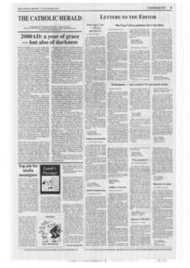Page 8, 29th December 2000
Page 8

Report an error
Noticed an error on this page?If you've noticed an error in this article please click here to report it.
Tags
Share
Related articles
Scripture Notebook
The Word This Week
God Takes On Our Frailty
Father David McGough
The Word
this week
Feast of the Holy Family
Ecclesiasticus 3: 2-6 and 12-14; Colossians 3: 12-21; Luke 2:41-52
4 F ATHER, help us live as the holy family, united
in respect and love." The opening prayer at today's mass leads us into the scriptures. Today we celebrate the family in which Jesus grew to maturity. We celebrate the care which nurtured his growth to wisdom.
Jesus truly shares our humanity. He became like us in all things but sin. We cannot grow, nor realise the wisdom entrusted to each one of us, without the loving care of the family that surrounds us. In purely human terms, Mary and Joseph provided this for Jesus as he grew from infancy to manhood. The love that reached out to the whole world in the ministry of Jesus was formed, in no small measure, by the love that had surrounded him in the hidden years. For sinful humanity, family life is far from perfect. Many of us carry the scars of a wounded childhood and family life. By his birth at Bethlehem. Christ embraced and redeemed sinful humanity. His years with Mary and Joseph healed and raised up the brokeness of family life.
The wisdom of Ecclesiasticus demands respect between the generations. The intimacy of family life often brings with it a presumption that takes for granted the dignity of those closest to us. Careless words and harsh judgements, spoken in the heat of the moment, can destroy a dignity that should be safeguarded despite our failings. Sinful pride does not hesitate to safeguard its dignity at the expense of those it loves. The reverse should be true. Within the family, our dignity is focused not upon ourselves, but upon the care which we have for the dignity of those we love. Mutual respect safeguards that dignity and love. The words of Ecclesiasticus guide us into this wisdom: "The Lord honours parents in their children... The kindness shown to parents will never be forgotten."
Paul's letter to the Colossians addresses the more practical issues of family life. We grow to perfection not because we are already perfect, but because God loves us in our brokenness, enabling us to grow. Our true identity is revealed in family life. Within the family those we love generally bear the wounds of our sinfulness. The quarrels and hurts we engender can take on a life of their own. ultimately destroying the love that we once felt.
St Paul proposes Christ as the starting point both for our family life and the family that is the church. Christ embraces our wounds with his own compassion, kindness and humility, gentleness and patience. We begin to act not so much from the wounds we inflict upon each other, but from the love that God has put into our hearts.
Family life can be possessive. refusing the necessary space for the growth of the other. Faith and trust demands that we continue to love those who grow away from a dependence on ourselves to take possession of their own lives. The concluding scene of Luke's infancy narrative, the finding of the child Jesus in the temple, describes this familiar scene. Mary and Joseph seemed to lose the child that was theirs. We sympathise with their concern. "See how worried your Father and I have been looking for you."
Their ultimate response was faith. The kind of faith that allows the unfolding of God's providence to be greater than our insecurities, The faith that allows a child to enter into his God given life.
blog comments powered by Disqus











